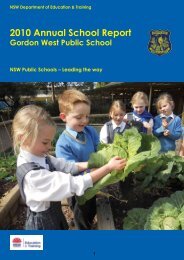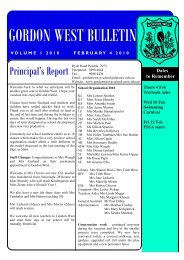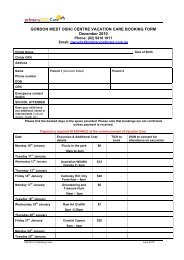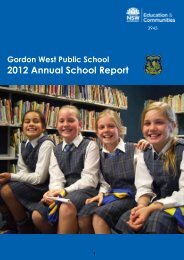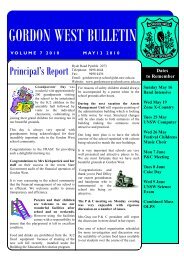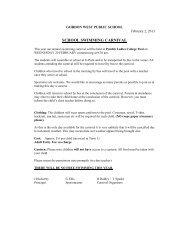2011 Annual School Report - Gordon West Public School
2011 Annual School Report - Gordon West Public School
2011 Annual School Report - Gordon West Public School
Create successful ePaper yourself
Turn your PDF publications into a flip-book with our unique Google optimized e-Paper software.
TECHNOLOGY<br />
With the increase in classes at <strong>Gordon</strong> <strong>West</strong> in <strong>2011</strong> there was<br />
a need to increase the Computer timetable from two to three<br />
days. Mr Graeme Coates took up the extra one day position.<br />
Mr Coates has many years experience in this field and has<br />
brought with him a wealth of expertise which has enriched the<br />
ICT program.<br />
Kindergarten, Year 1 and Year 2 attend lessons each week<br />
whilst Years 3, 4, 5 and 6 continue to attend once a term for<br />
5 weeks for a longer period of time. At <strong>Gordon</strong> <strong>West</strong> the ICT<br />
program is fully integrated into the school’s teaching and learning<br />
program. We believe ICT can have a positive outcome on<br />
student learning and understanding and that it can assist in<br />
student motivation and engagement.<br />
In <strong>2011</strong>, students from Kindergarten from to Year 6 learnt, reviewed<br />
or extended their skills using the Microsoft Office package.<br />
Activities included word processing, spreadsheets and<br />
presentations using PowerPoint and writing booklets, posters<br />
and calendars using Microsoft Publisher. Several grades enjoyed<br />
designing multimedia projects using MovieMaker and<br />
Photostory whilst others explored programs such as Google<br />
Earth, Kidspiration and Kidpix. Students from Years 3 to 6<br />
learnt how to manipulate photographs in a variety of ways using<br />
Photoshop.<br />
Year 6 entered a few competitions this year with the highlight<br />
being the “Picture Book” competition run by the CBCA. Three<br />
groups were chosen as finalists and together with Mrs Pickup,<br />
Miss Papic and several parents, attended the presentation<br />
at the Teachers’ Federation Auditorium in Surry Hills. <strong>Gordon</strong><br />
<strong>West</strong>'s The Bush Jumper came in 3rd, The Gobbling Tree 4th<br />
and Max 5th. The seniors participated in Google’s design competition<br />
‘Doodle 4 Google’ where young people from across<br />
Australia were invited to design their own doodle based on<br />
this year’s theme ‘My Future Australia’. The best doodles were<br />
voted on by the public and one winner had the honour of having<br />
their doodle displayed on the Google Australia homepage<br />
for a day. Our students came up with some excellent designs.<br />
Year 6 also entered Murder Under the Microscope, an interactive<br />
environmental online competition developed by the Department<br />
of Education and were successful in correctly solving the<br />
ficticous eco crime.<br />
With an extra “lab” of computers available in the library this<br />
year, students also had the opportunity to extend their research<br />
skills using a variety of different search engines.<br />
PROGRESS ON <strong>2011</strong> TARGETS<br />
Target 1<br />
Numeracy K-6 Space and Geometry – 2 and 3 Dimensional<br />
Space<br />
To increase student capacity to identify, describe and manipulate,<br />
using mathematical language, 2D and 3D space.<br />
Our achievements include:<br />
After the review of 2010 NAPLAN results, teachers at <strong>Gordon</strong><br />
<strong>West</strong> identified a weakness in the area of Space and Geometry,<br />
2D and 3D space for both Years 3 and 5. There was a<br />
decrease in the percentage of students in band 6 (Year 3) and<br />
band 8 (Year 5). Teachers began with the review of outcome<br />
statements to develop a shared vision and understanding of<br />
the skills of this curriculum area. A pre test was implemented<br />
which consisted of 2D and 3D space questions from past NA-<br />
PLAN papers (Years 2-6) and practical lessons (K-1). In stage<br />
groups, teachers analysed results and identified concepts requiring<br />
development.<br />
Two members of staff attended a DET inservice which provided<br />
schools with practical lesson plans and resources across the<br />
K-6 Space and Geometry continuum. Teachers collaboratively<br />
planned practical lessons with a focus on real life applications<br />
based on pre test data. Using ‘Teaching Space and Geometry<br />
K-6’ teachers designed explicit teaching and learning activities<br />
to improve students ability to identify, describe and manipulate<br />
using mathematical language in the areas of 2D and 3D space.<br />
A resource kit was compiled for use in the future.<br />
Late in Term 3, teachers conducted assessments including post<br />
testing (Years 2-6) and teacher observation (K-6). The results<br />
of these tests were compared with pre test data to ascertain the<br />
effectiveness of the intervention. The statistical data highlighted<br />
success of the intervention program. Through the collegial<br />
sharing of data, teachers reflected on the broad applications of<br />
this skill base across all key learning areas. They recognised<br />
the importance of consistent and frequent exposure in a variety<br />
of contexts to ensure students attain a thorough understanding<br />
of these often abstract concepts. Teachers commented that it<br />
was imperative to provide students with a variety of opportunities<br />
to touch, feel and manipulate shapes and objects in order<br />
to fully understand their properties. While appropriate resources<br />
took time to plan and organise, teachers remarked that the<br />
practical lessons were well received by students and encouraged<br />
positive mathematical language exchange.<br />
Target 2<br />
Literacy K-6 Writing – Persuasive Text<br />
To improve student knowledge, skills and understandings of<br />
persuasive texts.<br />
Our achievements include:<br />
Following 2010 NAPLAN analysis with K-6 staff, Michelle Mawer,<br />
DET English consultant visited <strong>Gordon</strong> <strong>West</strong> PS in Term 1 to<br />
discuss purposes of persuasive text, elements of persuasion,<br />
language devices and grammatical elements to achieve success<br />
when working with this text type. Staff found the discussion<br />
on the dissection of NAPLAN marking guide particularly<br />
useful.<br />
Through modelling of persuasive written and spoken texts using<br />
previous BST and ELLA marking guides, teachers provided<br />
students with a range of interesting and challenging work<br />
samples to motivate and introduce them to what delineates an<br />
effective, sustained argument.<br />
Teachers collected examples of persuasive text used in advertisements<br />
and newspaper articles, critiqued peer work samples<br />
and gave students opportunities to evaluate or give judgments<br />
through explicit spoken and written learning activities.<br />
Staff were encouraged to attend various professional learning<br />
opportunities to improve their knowledge and skills in teaching<br />
persuasive text. In Terms 2 and 3, <strong>Gordon</strong> <strong>West</strong> K-6 staff<br />
were inserviced by experienced teachers who informed them<br />
about available resources including websites and publications.<br />
Successful teaching and learning strategies were also shared.<br />
In Term 3, 2 members of staff attended the Northern Sydney<br />
Regional debating inservice which highlighted the link between<br />
persuasive text and debating.<br />
17



